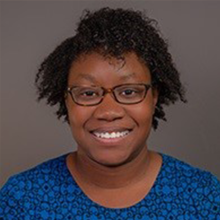November 2017 Spotlight on the SRCD Policy Fellow: Jameela Conway-Turner, Ph.D.
2017-2018 Federal Executive Branch Policy Fellow
Last year, when I sought my fellowship placement at the National Institute of Justice (NIJ), I came in wanting to learn how to communicate research to scientists, policymakers, and practitioners. With that goal in mind, I can definitely say that I came to the right place. Not only have I learned more about how to communicate research to a wide audience, but I have also gained an in-depth perspective of how my office works to advance the understanding of crime and justice by identifying knowledge gaps and calling for more research. Additionally, the presidential transition provided an exciting dimension during my first year! In a federal agency, presidential transitions come with new leadership and new questions about the direction of the office. Although all transitions come with uncertainties and anxieties, NIJ continues to work toward ensuring that research plays an important role in informing policy and that research gets into the hands of the practitioners.
NIJ is the research, development, and evaluation arm of the Department of Justice (DOJ), and is committed to using science to advance the knowledge and understanding of issues related to crime and justice. I work in the Office of Research and Evaluation in the Crime and Crime Prevention Research Division, where I focus on school safety issues. I primarily work on the congressionally mandated Comprehensive School Safety Initiative (CSSI). The goal of the CSSI is to build research and knowledge around school safety and provide evidence to support quality practices and programs that schools can implement. My primary project is developing a guide for school administrators to use to help shape the decisions they make within their schools related to school safety. In addition to synthesizing the research, I have also met with school safety stakeholders from across the nation (e.g., researchers, teachers and administrators, school psychologists, school resource officers) to elicit their expert opinions on how to make schools safe, how different approaches can be implemented in schools, and how this knowledge can be best used by school administrators. Having those meetings was one of the most rewarding parts of working on this project. While I am well informed about the school safety research, the people who work in schools every day are the real experts, and getting their thoughts and opinions is the best way to make sure the guide my office is developing is both accurate and useful to the work they do.
This project is a reminder that while research is important, it is just as important to ensure it has a real world impact – to be used to help practitioners make decisions to improve the lives of children and families. Now, more than ever, I am convinced that our research as developmental scientists can and should help provide insights into complex policy issues. I continue to be grateful for the opportunity to be a SRCD fellow. Not only have I been able to work with brilliant scientists here at NIJ, but I have also been able to meet and learn from others doing this kind of work in other federal agencies and other organizations inside and outside of D.C. The experiences I have had are invaluable, and I am excited to see what is next for me.
